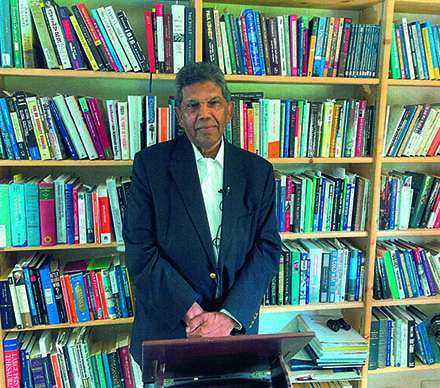In a 2022 book on the History of Ideas titled “Confronting Leviathan”, David Runciman, University of Cambridge Professor of Political Philosophy asks “Is the state that we built to keep us safe going to be our saviour or our destroyer?” This is an apposite question in Guyana, whichever party is in power.
In a telling comment, Runciman writes, “The founding idea of modern politics is representation. This is Hobbes’s idea. In a modern state, power is delegated. It is handed over to a smaller group of people who exercise it on behalf of the larger group and the larger group acquiesce in that: they authorise it, they legitimate it, but they also live under it and they live with the consequences of it.” Indeed, Guyanese have been living with the consequences of their political rulers, whichever party is in government.
In this piece, I ask the question: “Has Guyana been experiencing empirical autocracy, both under the PNC and the PPP: the autocracy of arbitrariness, mismanagement, and corruption?” And I invite the commentariat to share their reflections on this question: soberly, dispassionately, and without invective. The question posed is one of political philosophy.
Let us first define our terms, using the Concise Oxford Dictionary. Empirical means “based on observation”; Autocracy means “absolute government; controlling influence”; Arbitrary means “capricious, unrestrained”; Mismanagement means to “manage badly or wrongly”. Corruption means “moral deterioration, use of corrupt practices such as bribery”.
Under the PNCR regime, was there not empirical autocracy, or absolute government, followed by prolonged efforts in 2020 to subvert the will of the electorate? Was there not arbitrariness in the negotiation and signing of the oil contract? Was there not mismanagement and corruption?
And what about the current dispensation under the PPP/C? Is there not empirical autocracy, or absolute government? First, arbitrariness: A Stabroek News editorial of October 12, on “The President’s speech to Parliament” commented: “Increasingly it is evident that President Ali thinks that the future of the country is only for the PPP to decide and that the opposition parties, by virtue of the 2020 election shenanigans have deprived themselves of that right.” Parliamentary committees rarely function; and consultation with the opposition is perfunctory at best.
Second, mismanagement: A news item in the Stabroek News on October 14 reported that “In a damning indictment of the Guyana Police Force (GPF), its oversight body, in its latest report, has described numerous shortcomings, including ignorance of or failure to adhere to standing orders, ignorance of fundamental rights and key laws, misuse of police powers, alleged unlawful arrests and intimidation.
“These and other concerning defects within the GPF are highlighted in the Police Complaints Authority (PCA) 2023 Annual Report, distributed on October 10, 2024. In the report, PCA Chairman Justice (rtd) William Ramlal detailed numerous violations of the PCA Act and raised concerns about the oversight and accountability of police actions, particularly regarding fatal incidents involving officers.”
Third corruption. On October 14, Stabroek News carried an editorial on “Procurement integrity and the Belle Vue Contract” in which it concluded: “The evidence of corruption in procurement is available in the arrangements for the contract for the Belle Vue pump station and until firm action is taken words don’t mean a thing.” The pages of the news media are laced with letters and representations about the incidence of corruption.
Is there evidence of empirical autocracy in Guyana? I invite the commentariat to help Guyanese think through this situation. And I suggest they bear in mind Professor Runciman’s point that “In a modern state, power is delegated. It is handed over to a smaller group of people who exercise it on behalf of the larger group and the larger group acquiesce in that: they authorise it, they legitimate it, but they also live under it and they live with the consequences of it.”
And those consequences can be devastating for the lives of the electorate: for the health of their natural environment; for the quality of their lives and those of their children; for whether they are able to meet their basic needs or they live in poverty and in want; for whether they receive justice and fairness from those who exercise power on their behalf – while living lives of glitter and splendour.
How, in Guyana, are we to exercise control over the small group of politicians who exercise power on our behalf? How are we to ensure efficiency, justice, probity, decency, and fair-mindedness? How are we to do these things when reports of auditors-general go unheeded? When ombudspersons are shadow persons? When Parliamentary oversight is non-existent? When the rights commissions are mirages? And when the Chancellor of the Judiciary and the Chief Justice endure prolonged acting appointments?
How are we to control the politicians in Government?






